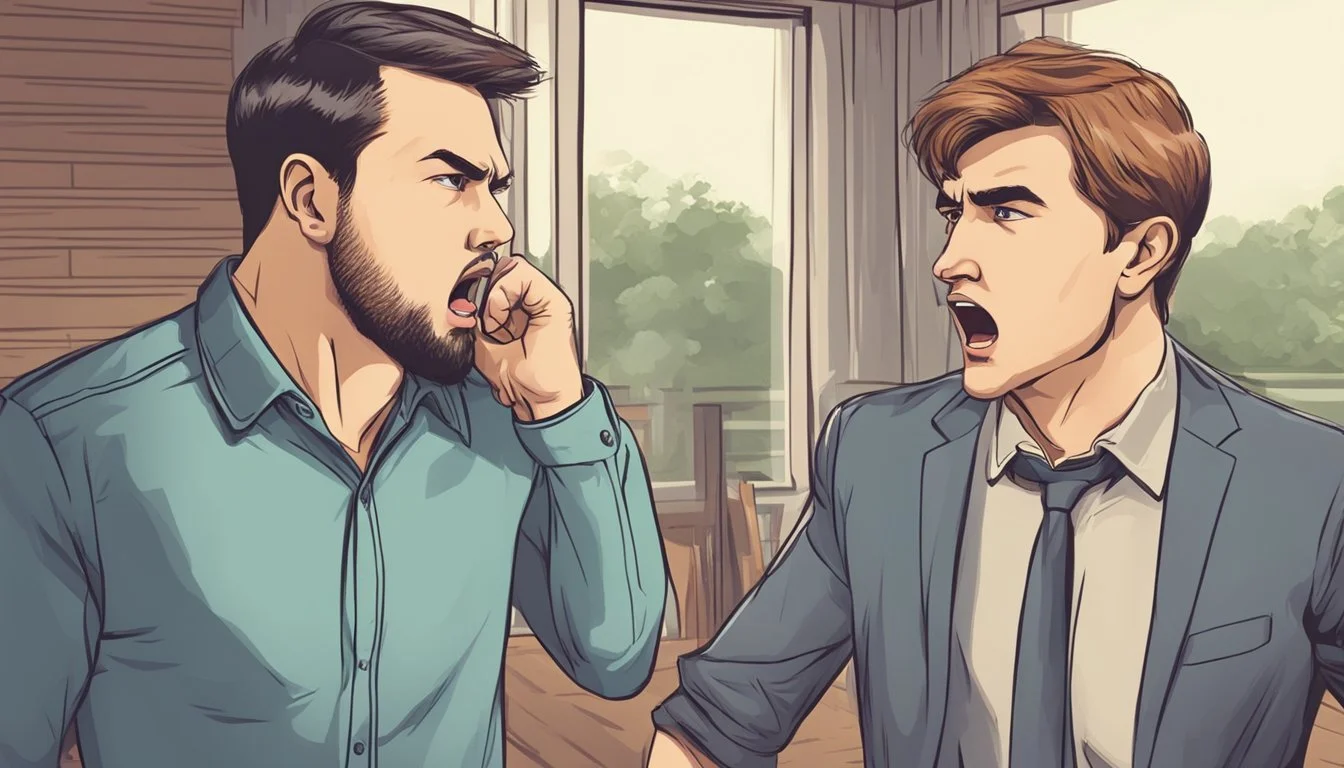14 Friendship Red Flags You Should Never Ignore for Healthier Relationships
Navigating friendships can be complex, and it's essential to recognize warning signs that a relationship might be unhealthy. These red flags can range from subtle behaviors to overt actions that may compromise your well-being.
Recognizing these signs early can save you from unnecessary stress and emotional drain. Understanding what to look for can empower you to make decisions that foster healthier and more supportive friendships.
1) Constant Negativity
A friend who consistently exhibits constant negativity can be draining. They always focus on the negative aspects of life and rarely see the silver linings. This can affect the mental well-being of those around them.
Negative friends often complain about everything. From minor inconveniences to significant life events, nothing seems to satisfy them. This behavior can lead to a toxic environment.
Consistent criticism is another sign of constant negativity. These friends might belittle others' achievements or downplay successes. Their inability to celebrate others can foster resentment and dissatisfaction in the friendship.
Moreover, constant negativity can manifest as a lack of support. Instead of offering encouragement during tough times, these friends might focus on the downsides, further lowering morale.
It's essential to recognize this red flag early. Prolonged exposure to negative attitudes can significantly impact one's happiness and outlook on life. Consider addressing concerns with the friend directly or reevaluating the friendship if negativity persists.
2) Lack of Support
A true friend should be someone who celebrates your victories and supports you during tough times. If someone's friendship feels one-sided, where they are constantly taking without giving, this is a clear sign of a lack of support.
They may dismiss your achievements or fail to show any interest in your life events. This can leave you feeling isolated and unimportant.
In relationships, mutual support is essential for maintaining a healthy bond. If your friend often fails to provide encouragement or prioritizes their needs above yours, it's worth considering the long-term viability of this friendship.
A persistent lack of support can erode your self-esteem and hinder your personal growth. It's important to evaluate whether your friend is truly there for you when you need them the most.
For more on signs of dysfunctional friendships, the The Zoe Report explains key indicators to look out for.
3) Overly Critical
Friends who are overly critical can have a significant negative impact on one's self-esteem. Constructive criticism is healthy, but constant negativity is another matter. It can erode confidence and contribute to feelings of inadequacy.
These individuals may always find faults, even in situations where it's unnecessary. Their need to criticize can make one feel unsupported and undervalued. This type of behavior is a red flag that should not be ignored.
It’s important to distinguish between occasional constructive feedback and a continual pattern of harsh judgments. Persistent criticism from a friend suggests an underlying issue that might need addressing. This type of friendship can be draining and detrimental to mental well-being.
If a friend frequently puts down your ideas, choices, or accomplishments, it’s essential to recognize this as potentially toxic behavior. A healthy friendship should involve mutual support and respect, not relentless scrutiny.
For more detail, consult Self's article on friendship red flags which elaborates on how critical friends can affect one's self-esteem and well-being.
4) Frequent Jealousy
Frequent jealousy in a friendship is a significant red flag that can poison the relationship. If a friend often exhibits envy over your achievements, relationships, or possessions, it can create a toxic atmosphere.
Jealousy can manifest in various ways, such as making passive-aggressive comments or trying to undermine your successes. These behaviors can erode trust and mutual respect.
A friend who is frequently jealous may also engage in one-upmanship, where they feel the need to outdo your accomplishments. This can lead to competition rather than mutual support.
Frequent jealousy indicates insecurity and a lack of confidence in the friendship. It can also suggest deeper issues that the friend may need to address on their own.
For more information on understanding these red flags, you can visit 9 red flags in friendship you should never ignore.
5) Dishonesty
Dishonesty is a critical red flag in any friendship. If a friend frequently lies or withholds the truth, it undermines the trust that is essential for a healthy relationship. Deception can take various forms, including exaggerations, omissions, or outright fabrications.
A dishonest friend may make false promises or fail to follow through on commitments. They might tell you what they think you want to hear instead of being truthful. This behavior erodes trust and creates an unstable foundation for the friendship.
It's important to recognize dishonesty early on. Consistent lying, whether about small details or significant issues, indicates a lack of respect for the friendship. This pattern suggests they may not value your relationship as much as you do.
Dishonesty can also manifest in more subtle ways, such as misleading you or giving half-truths. This can cause confusion and lead to misunderstandings, which can damage the relationship further.
If you catch a friend lying repeatedly, it may be time to reevaluate the friendship. Healthy friendships are built on honesty and transparency. Without these, the relationship is unlikely to thrive and may even cause you emotional harm.
For further insights on identifying dishonesty in friendships, this article provides additional information.
6) Manipulative Behavior
Manipulative behavior in a friendship is a major red flag. It can manifest in various forms, such as guilt-tripping, excessive criticism, or subtle control tactics. Friends who manipulate often exploit vulnerabilities to gain advantage, making the other person feel responsible for their happiness or well-being.
An example of manipulative behavior is a friend who constantly belittles achievements or points out flaws. This can undermine self-confidence and create dependency. They may also use backhanded compliments, masking their criticisms in a way that makes the other person doubt themselves.
Another common tactic is emotional blackmail, where a friend might use their emotions to control. Statements like "If you really cared about me, you would..." are designed to coerce into actions that benefit them.
Manipulative friends might also isolate their friends from others. They could discourage spending time with other people, fostering a sense of dependency and control. This limits the person's social support system, making them more reliant on the manipulative friend.
In extreme cases, manipulative behavior can involve gaslighting. This is when someone makes another person question their reality or memories, creating confusion and doubt. This can erode trust and self-esteem over time.
Identifying and addressing manipulative behavior is crucial for maintaining healthy relationships. It ensures that friendships are based on mutual respect and equality, rather than control and exploitation. Recognizing these signs early can prevent potential emotional harm and preserve one's well-being.
7) Disrespectful Remarks
Disrespectful remarks are a significant red flag in any friendship. If a friend frequently belittles or insults you, it's an indication of a toxic relationship. Respect should be the foundation of any friendship, and consistent disrespect undermines this principle.
These remarks can be direct or passive-aggressive. Direct insults are easier to recognize, while passive-aggressive comments may be more subtle yet equally harmful. Both forms of communication can affect one's self-esteem and well-being.
A friend who constantly makes jokes at your expense or downplays your achievements is displaying disrespect. It's important to recognize these signs early and address them directly. Ignoring such behavior can lead to long-term emotional harm.
Feeling uncomfortable or anxious around a friend because of their remarks is a clear indication that something is wrong. Trust your instincts and pay attention to how their words make you feel.
Friends should uplift and support each other. If a friend cannot communicate without resorting to disrespectful remarks, it may be best to reevaluate the relationship. Respect and kindness are essential in maintaining a healthy and supportive friendship.
8) Inconsistency
Inconsistency in a friendship can manifest in various ways. A friend might frequently change their behavior, making it difficult to predict how they will act in different situations.
They might be supportive and attentive one day, and distant or unresponsive the next. This erratic behavior can create a sense of instability and uncertainty.
Inconsistent communication is another red flag. If a friend often cancels plans at the last minute or goes long periods without responding to messages, it can indicate a lack of commitment or respect for your time.
It might also reflect deeper issues such as a lack of interest in maintaining the friendship. Friends who are unreliable in keeping promises or following through on commitments can create frustration and disappointment.
This inconsistency can chip away at the trust and reliability that are fundamental to a healthy friendship. Recognizing these patterns and addressing them directly can help determine whether the friendship is worth preserving or if it's causing more harm than good.
9) Frequent Unreliability
A significant red flag in friendships is frequent unreliability. When a friend repeatedly cancels plans at the last minute or fails to show up, it can be frustrating and hurtful.
This type of behavior often indicates that the person doesn't value your time. Constantly making excuses or forgetting commitments suggests a lack of respect for the relationship.
Sometimes, unreliable friends may promise to help or support you but fail to follow through. This can create a pattern where you're left feeling unsupported and disappointed.
If a friend is consistently unreliable, it may be worth reevaluating their role in your life. Dependability is crucial in fostering trust and a strong foundation in any friendship.
Inconsistent availability or communication can also be a sign of frequent unreliability. If you can never count on them to be there when you need them, the friendship may not be as solid as you think.
Addressing the issue directly with your friend can help clarify their intentions and potentially improve the situation. Honest communication is key to resolving such problems.
10) Excessive Neediness
Excessive neediness in a friendship can be emotionally exhausting. A friend who constantly requires your attention, validation, or support without reciprocating can create an imbalanced relationship. Such neediness often stems from insecurity or lack of self-confidence.
A needy friend may overly rely on you for emotional support and reassurance. They might expect you to drop everything to be with them or respond instantly to their messages. This can intrude on your personal time and responsibilities.
Over time, this behavior can lead to feelings of resentment. It's important to set boundaries with needy friends to ensure that the relationship remains healthy. Clear communication about your availability and emotional capacity can help manage their expectations.
In many cases, professional help or counseling can benefit a friend exhibiting excessive neediness. Encouraging them to seek support outside the friendship may relieve some pressure on your relationship and provide them with additional coping strategies.
11) Lack of Boundaries
A clear sign of a problematic friendship is the lack of respect for boundaries. In healthy relationships, both individuals should feel comfortable expressing their limits.
When a friend constantly disregards your boundaries, it can lead to feelings of discomfort and resentment. This behavior might manifest in various ways, such as always showing up unannounced or constantly demanding your time.
Boundary issues often arise when one person feels entitled to the other's personal space, belongings, or time. If a friend frequently imposes without asking for consent, it's a red flag that they may not respect your autonomy.
In more severe cases, a lack of boundaries can also translate to emotional manipulation. Friends who insist on knowing every detail of your life, or who become overly controlling, are not respecting the necessary personal space in a relationship.
The inability to maintain healthy boundaries can be draining. It often results in feeling overwhelmed and less inclined to engage with that person. Recognizing and addressing this issue is important to preserve your own well-being.
Feelings of guilt or fear of confrontation should not prevent you from setting clear boundaries. A friend who values you will understand and respect your need for personal space and time.
Consistent boundary violations indicate a fundamental imbalance in the friendship. Being firm with your limits is crucial for maintaining a healthy, respectful relationship. If a friend repeatedly ignores these signals, it might be time to reevaluate the friendship.
12) Excessive Drama
When a friend consistently brings excessive drama into a relationship, it can be exhausting and detrimental.
Such friends often find themselves in constant turmoil, whether through personal issues or conflicts with others. They may involve you in their problems, creating unnecessary stress.
Friends who thrive on drama tend to exaggerate situations. Small disagreements can quickly escalate into major disputes.
These individuals often seek attention and validation. They may stir up controversy or create conflict for the sake of staying in the spotlight.
Excessive drama can also manifest through gossip. If a friend frequently talks about others behind their backs, it can signal a toxic pattern.
Drama-prone friends might also display inconsistent behavior. Their moods and attitudes may change rapidly, making the friendship unpredictable.
Recognizing these signs early can help maintain a healthy and balanced friendship. For more information on identifying friendship red flags, consider visiting these expert insights.
13) Ignoring Your Opinions
A key aspect of a healthy friendship is respect for each other's opinions. When a friend consistently dismisses or ignores your viewpoints, it can create an unbalanced dynamic. This behavior suggests that they do not value your thoughts or feelings, which can harm your self-esteem over time.
Frequent disputes or interruptions when you express your opinion indicate a lack of regard for your perspective. A friend who considers only their viewpoints can make you feel unheard and undervalued. It’s essential to have mutual respect in a friendship for it to thrive.
Ignoring your opinions can lead to unresolved conflicts and resentment. If your friend continually dismisses your ideas or concerns, it may be time to reassess the relationship. Stable friendships are built on a foundation of mutual respect and understanding.
If you notice this pattern, it may be beneficial to address the issue directly with your friend. Communication is critical to resolving misunderstandings and ensuring both parties feel valued. Relationships where only one person's views are acknowledged can be draining and unhealthy.
14) Lack of Empathy
A lack of empathy in a friendship is a significant red flag. Empathy involves understanding and sharing the feelings of another person. When a friend consistently shows little to no empathy, it can create a disconnect in the relationship.
Friends are expected to provide emotional support, especially during tough times. When someone fails to empathize, it suggests they might not genuinely care about your well-being.
This absence of empathy can manifest in various ways. It might be ignoring your feelings, downplaying your problems, or interrupting you to talk about their own issues. These actions indicate a lack of respect and consideration.
In some situations, the friend may even become frustrated or annoyed when asked for support. They might label you as "too emotional" or "overly sensitive." This behavior belittles your emotions and invalidates your experiences.
Trusting your instincts is essential. If you feel emotionally unsupported, it might be a sign that the friendship isn't as healthy as it should be. Emotional reciprocity is a cornerstone of strong, lasting friendships.
Signs such as these suggest that the friend is not invested in nurturing a mutually supportive relationship. These signs indicate an imbalance and the potential for toxicity in the friendship.
Understanding Friendship Red Flags
Identifying red flags in friendships is crucial for maintaining healthy and supportive relationships. Recognizing and addressing these signs early can prevent emotional harm and preserve your well-being.
Definition of Red Flags in Friendships
Red flags in friendships are behaviors or patterns that indicate potential problems. These signs often harm the emotional and mental health of those involved. Common red flags include constant negativity, jealousy, and one-upmanship.
Another concerning behavior is when a friend consistently makes everything about themselves, disregarding your feelings or needs. Additionally, friends who belittle your achievements or frequently insult you are demonstrating toxic tendencies. Such patterns should be taken seriously, as they can lead to a draining and unhealthy relationship dynamic.
Importance of Recognizing Red Flags Early
Early recognition of friendship red flags allows for timely intervention. Addressing these issues promptly can either mend the relationship or help you decide if it’s best to part ways. This proactive approach saves emotional energy, reducing stress and potential anxiety.
Ignoring red flags can result in prolonged exposure to toxic behaviors, which may affect self-esteem and overall mental health. Being aware from the start helps in setting healthy boundaries and ensures that friendships are supportive and reciprocal. Recognizing these signs early empowers individuals to foster positive, nurturing relationships that contribute positively to their lives.
Psychological Impact of Negative Friendships
Negative friendships can significantly affect an individual's emotional well-being and mental health. They often leave a lingering impact that can manifest in various ways.
Emotional Consequences
One primary emotional consequence of negative friendships is a persistent feeling of emotional drain. Individuals may frequently feel exhausted, anxious, or unhappy after interacting with a toxic friend. This emotional toll can lead to increased stress levels, affecting their daily life and interactions with others.
Feelings of low self-esteem and self-worth are common. Toxic friends may engage in behavior such as making demeaning comments or monopolizing conversations, leaving the affected person feeling undervalued and disrespected. The consistent lack of support can also exacerbate feelings of loneliness and isolation because the individual feels they cannot rely on their friend during challenging times.
Mental Health Considerations
The mental health impact of negative friendships is profound. Exposure to chronic stress from these interactions can contribute to or worsen mental health conditions such as depression and anxiety. For some, this stress may manifest physically, resulting in symptoms like headaches or changes in appetite.
Furthermore, the consistent undermining and negative behaviors often seen in toxic friendships can lead to difficulty in trust. This can make it challenging for individuals to form and maintain healthy relationships in the future. When someone repeatedly experiences betrayal or emotional harm, it can create a heightened sense of suspicion and reluctance to be vulnerable with others.
In severe cases, the mental health considerations may extend to more serious psychological issues, requiring professional intervention to manage and mitigate the damage caused by prolonged exposure to toxic friendships.












